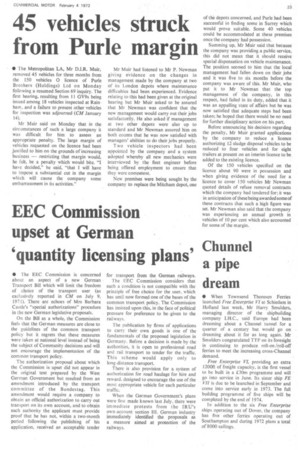EEC Commission upset at German 'quantity licensing plans'
Page 25

If you've noticed an error in this article please click here to report it so we can fix it.
• The EEC Commission is concerned about an aspect of a new German Transport Bill which will limit the freedom of choice of the transport user (as exclusively reported in CM on July 9, 1971). There are echoes of Mrs Barbara Castle's "special authorizations" procedure in the new German legislative proposals.
On the Bill as a whole, the Commission feels that the German measures are close to the guidelines of the common transport policy but it regrets that these measures were taken at national level instead of being the subject of Community decisions and will not encourage the implementation of the common transport policy.
The authorization proposal about which the Commission is upset did not appear in the original text prepared by the West German Government but resulted from an amendment introduced by the transport committee of the Bundestag. This amendment would require .a company to obtain an official authorization to carry out transport on its own account, and to obtain such authority the applicant must provide proof that he has not, within a two-month period following the publishing of his application, received an acceptable tender for transport from the German railways.
The EEC Commission considers that such a condition is not compatible with the principle of free choice for the user, which has until now formed one of the bases of the common transport policy. The Commission has insisted upon this, in the face of political pressure for preference to be .given to the railways.
The publication by firms of applications to carry their own goods is one of the fundamentals of the proposed legislation in Germany. Before a decision is made by the authorities, it is open to professional road and rail transport to tender for the traffic. This scheme would apply only to long-distance transport.
There is also provision for a system of authorization for road haulage for hire and reward, designed to encourage the use of the most appropriate vehicle for each particular traffic.
When the German Government's plans were first made known last July, there were immediate protests from the IRU's own-account section III. German industry immediately identified the proposals as a measure aimed at protection of the railways.














































































































































